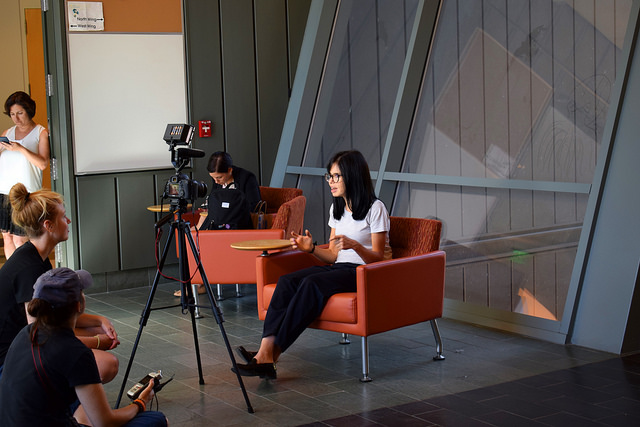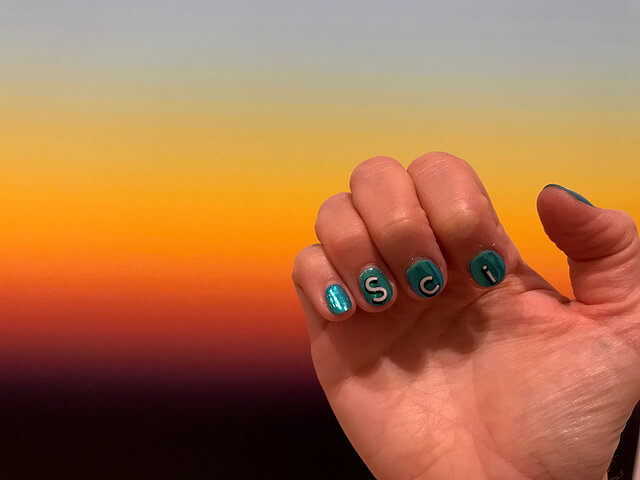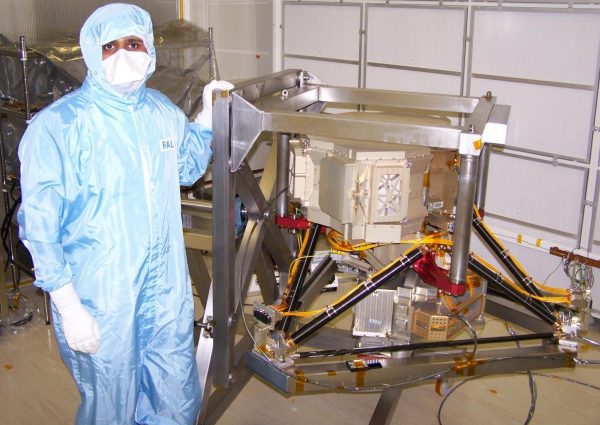Hi Jess! So, you’re a physicist, but that title covers so many different things! Can you describe a typical day in your work life, for us?
Hi Team Space Diary! I work in the Department of Physics and Centre for Plastic Electronics at Imperial College London. This is tough as there is no such thing as a ‘typical day’! My research involves creating organic light emitting diodes from carbon-based semiconductors. These are materials like polymers (long chains of repeating units) and small molecules, where special carbon-bonding leaves charges that can move about across the structure. This means the materials don’t behave like insulating plastics (which we would expect for carbon based materials) or conducting metals, but halfway between the two. We control their electronic properties with the chemistry, so we can make materials that can absorb or emit light at specific energies.
I spend everyday thinking about these materials and working out how to make devices out of them. I might wake up, cycle to work, turn on some lasers or equipment that needs warming up… and then go into the clean room. The clean room is a very clean environment with less than 1,000 0.5 μm particles per cubic foot. This is where we make our devices and structures. Then we take them out of the clean room, and use different microscopes and different types of spectroscopy to understand how the molecules are behaving in the devices.
Because I’m a grown-up researcher, I also look after new students to our lab, who are doing year-long masters courses or three-year PhDs. This year one of our students is using the molecules to try and build neurons! I am lucky enough to be able to teach undergraduates, which is really awesome as not too long ago I was them.
Imperial is the most exciting place I have ever been – the students, staff and atmosphere are all brilliant. We are very international and diverse, which means the research and discussion is rich with different cultural backgrounds and perspectives. Our science moves so much quicker with a bunch of different experiences in the lab.
What interests did you have as a child and how were you as a pupil at school?
Before I did my physics degree I studied art at Chelsea College of Art & Design. I loved art at school and still do it a bit now – either through doodling my way through lectures or designing my family’s Christmas card. I also loved cooking, cycling and swimming, which I still do now on the weekend and in the evening. I am very close to my family and spend all of my free time with my mum – she is an academic psychiatrist working in student mental health at UCL, and was my absolute inspiration growing up. I value her opinion more than anyone else I know.
At school I was a little bit naughty – I may have had one or two detentions as a teenager. I loved music and went to see a lot of bands during my GCSEs and ASs, which wasn’t always what my parents wanted. When I realised how important A-Levels were for me to keep options open for the rest of my life as a scientist / engineer, I buckled down the hatches and worked like crazy. Luckily I had chosen subjects (Maths, Further Maths, Chemistry, Physics and Art) that let me study whatever I wanted, wherever I wanted.

What were the steps you took to reach where you are now [i.e. a career pathway!] and where do you wish to see your career go?
I didn’t plan anything, so don’t get your career advice from me! I always knew I wanted to study a physics degree but had no idea how long I’d stay in the same department ☺. I applied for my physics degree during my art foundation course, which was tricky, as my school had other pupils they needed to worry about and didn’t necessarily appreciate me coming back and taking up their time. When I got in to Imperial, my life changed – I was surrounded by world-leading researchers, who in between experiments at CERN (the large hadron collider / particle accelerator in between France and Switzerland or meetings with world leaders in Washington D.C. or appearances on the BBC, were taking time to lecture us. I would be e-mailing people for help on maths homework who were in South Korea taking measurements at Samsung. I fell in love with research during my final year, where we took an extended research project working in a group. It was my first taste of academic freedom – I was handed the keys to a lab where I could choose when, what and why I did experiments. I was working in a team of people who were united by their enthusiasm for renewable energy and new materials. They were both the strangest and most brilliant collection of people I had ever met, and I think will remain my friends for a very long time. I would love to one day lead my own research group, come up with my own research projects and apply for money from funding bodies. The most successful science groups are the most diverse; and I would work hard on recruiting researchers from underrepresented groups to make science equal, fair and fun for everyone. I would love to work more with science policy; working alongside politicians and sharing my enthusiasm for science (and new materials!).
What has been the biggest challenge in your career so far and how did you overcome it?
The biggest challenge I have faced is overcoming ‘imposter syndrome’ and building up my own confidence. As a scientist, you have to be prepared to stand up and talk about your understanding of particular problems, defending your theories and giving seminars to huge audiences. We have so many visitors at Imperial, you have to be able to speak to everyone: From primary school children to school teachers to Nobel Prize winners and the President of China! Knowing that everyone gets nervous and doubts their own abilities is an important thing to remember. When you are surrounded by such brilliant and intelligent people, you start to question where you fit in.
Another challenge that faces women in science is deciding what to say yes to. Unfortunately, there aren’t enough girls in science at school or university, which means that when it comes to being employed after your degree, everyone wants to hire a relatively small number of women!
What advice would you give your eight-year-old self about building a career in science?
I’d say “stick at it Jess!” Also pay attention in maths and start reading about bioelectronics, because maybe biology isn’t as boring as you think it is ☺. I would tell eight year olds everywhere to find the thing they love that keeps them excited and keeps them asking questions – whether it is art, music, stargazing or speed boats – and how they can make that industry better. I loved mixing potions in the bath and making a mess in the kitchen, and now I work with a lot of synthetic chemists who do that as a job! So, eight year olds, take things a part! Make mistakes! But study maths.
You do a lot of work advocating for #girlsinSTEM through Women in Physics—which you set up at Imperial College—and through the WISE young women’s board. What got you passionate about this work?
I was lucky enough to attend an all-girls school, which was great (South Hampstead High School) for both my physics knowledge (I had insanely brilliant teachers, Mr Hearn and Dr Walgate), but also for building my confidence and curiosity. Unfortunately, most girls don’t go to all-girls schools – and out of all UK mixed state secondary schools, less than half send any girls to study physics A-level. Actually, the stats say I was two and a half times more likely to take A-level physics than most girls in the country. My job is amazing – I was up every day with a head full of questions and a huge rush of excitement. It doesn’t seem fair that not everyone has the chance to do it, or even any concept of what a career in physics is. If I wake up tomorrow and never want to set foot in a lab again but would LOVE to become an engineer, I can, because I have chosen subjects that let me do that (maths and physics). If girls don’t make those choices, it will be much harder for them.
The country needs more scientists and engineers because we are running out – the decision to leave the EU coupled with an ageing and retiring work force means we have a big skills gap. I don’t want girls to do these jobs because they are there, I want them to do them because they are brilliant jobs. Diverse teams are more successful and innovative, and the world needs fresh thinking now more than ever.
I have been lucky to learn from the masters at the Institute of Physics, who thanks to considerable effort and research have managed to increase the number of girls studying physics A-Level. For teachers or interested parents, the IOP have a range of resources on their website to tackle gender bias at school [read more here].
You’ve mentioned several times that role models for students don’t work. What do you think would be the difference in impact if we shifted our focus from role models to mentors and what can we do to link students with more mentors?
Of course everyone finds inspiration in different people and things. Efforts to increase the numbers of girl in science generally focus on a few things assuming it is because girls are not interested, blaming them for making the wrong decisions, renaming labs after impressive women, holding girls only workshops or getting ‘role models’ to talk in schools. These high achieving women usually take an afternoon off, visit a school, do a one-off talk and leave – they feel great because they’ve done some ‘outreach’, and the schools remember them for a few days or weeks. The women who speak are, of course, wonderful – they win prizes, they form successful start-ups, they speak five languages, they have two kids and three dogs and travel the world. If I saw them speaking when I was a teenager, I’d freak out, feel inadequate, and feel even more alienated from the subject. Another issue is trying to work out exactly who in the audience these role models are speaking too. My friend Abbie Hutty, a scientist for the European Space Agency ExoMars mission, said it very succinctly in her TED talk: scientists and engineers are often introverts, whereas we put a bunch of extroverts in front of them and expect them to get excited.
What we haven’t really thought about is why girls don’t do physics. Girls make very, very good physicists and mathematicians. All they need is a bit of work on the confidence and resilience side. They need mentors (who see them regularly for a sustained period of time) who are exciting enough to inspire and approachable enough not to seem intimidating. These mentors are real people who make mistakes, have a sensible work-life balance and are passionate about what they do.
You come from a ‘science family’ but of course, all families are different! What advice would you give to parents/guardians/teachers who recognise an interest in STEM subjects in their own children/students?
Find some great books and take to the internet. We are lucky in the UK to have a great culture of scientists and engineers writing popular science books, which are accessible to parents and kids (Mark Miodownik, Laurie Winkless, Angela Saini, Graham Farmelo, Marcus du Sautoy, Carlo Rovelli, Kat Arney, Hannah Fry). Take them to your local university and look around all the research groups – find what they find particularly exciting and celebrate it. Check out the BBC’s incredible science shows on the radio (Life Scientific, In Our Time, Inside Science, Science Stories) and TV (Expedition Volcano, Big Life Fix). Get out to museums and galleries (Science Museum, Design Museum, London Transport Museum). Join a learned society, as these are often free for under eighteens and help throughout their scientific career (IET, IOP, RAEng, RSC…). Start to go to free evening lectures and weekend talks, often held at learned societies or at the Guardian/Times. Enter competitions and challenges – and keep entering them. Finally, keep track of everything you do and everyone you talk to – they will be more than happy to help you later on down the line. All of these applies to students who don’t show an immediate interest in science too – inviting everyone to the party will let them choose whether or not they dance ☺.

We love your doodles! How do you think they aid your science communication?
My doodles aren’t there to ‘aid my science communication’, but to help my little simple mind think. I can’t visualise complicated scientific concepts just with words, so when I attend lectures I like to sketch things out and link them to topics I’ve heard before. I can remember things a lot better when I’ve drawn them out that when I have just taken notes. It’s a nice entry-point to difficult ideas, so is much easier to share with non-expert audiences or people (like me!) with short attention spans.
If you weren’t a physicist, what would you be?
I’d probably be a chef – I’ve long dreamed of working at Noma in Copenhagen or Osteria Francescana in Modena. If not working in a Michelin starred restaurant (maybe that’s a bit too optimistic!) I’d be an illustrator.
What would you say is your favourite thing about physics?
There is nothing about physics that doesn’t surprise and amaze me. Science is a team game, and when we work together we can achieve things no one thought possible. To detect Einstein’s predicted gravitational waves took more than 1,000 scientists working across America, Europe and Asia. It amazes me that we can use a piece of paper, a pen and an equation to predict the orbit of a planet, calculate the time between beats of a pendulum and work out how fast a speeding police car is moving from the sound of its siren.
To find out more about Jess’s work, visit her website: makingphysicsfun.com
You can also follow Jess on Twitter @jesswade
You might also be interested in reading our interview with Abbie Hutty.



